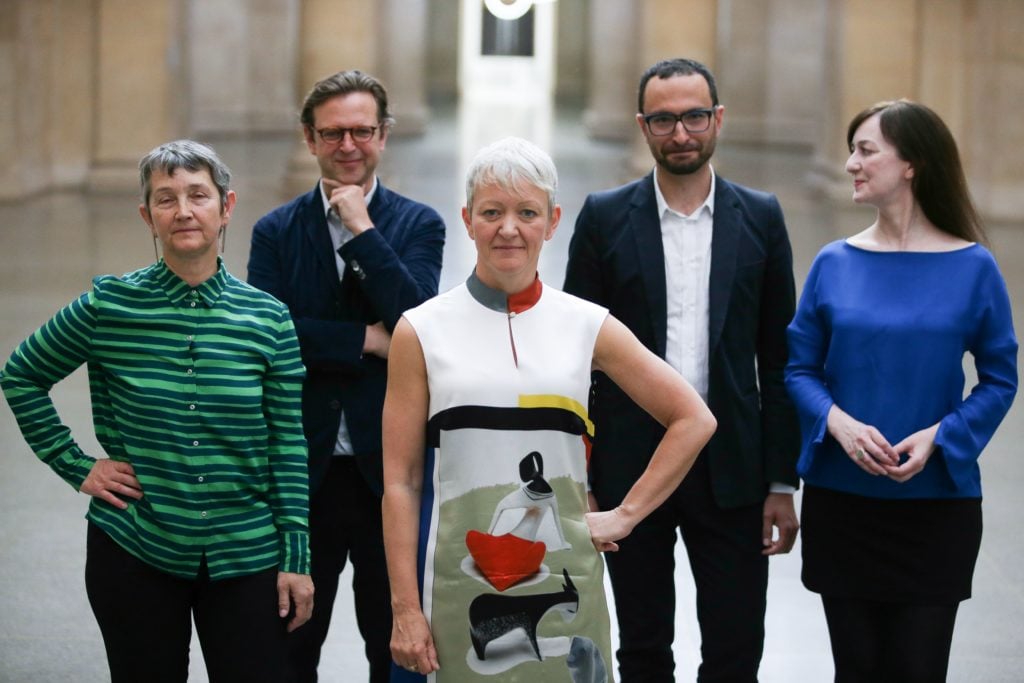Art World
As the UK Heads Into an Uncertain State of Lockdown, Museums Are Closing in Rapid Succession
Just last week, the Tate Modern opened a blockbuster Warhol exhibition.

Just last week, the Tate Modern opened a blockbuster Warhol exhibition.

Javier Pes

Museums in the UK are closing one after the other amid the coronavirus outbreak.
All four locations of the Tate are shuttering as the country goes into semi-official lockdown, with London’s Victoria & Albert Museum, the Natural History Museum, and the Barbican Art Gallery all quickly following.
This morning, spokeswoman for the British Museum says: “We are awaiting further guidance from DCMS and the government today.” She stressed that the health and safety of its staff and visitors is an absolute priority. The museum remains open in the meantime. By the end of the day, the museum confirmed it was closing on March 18 indefinitely, a step its director, Hartwig Fisher took with a “heavy heart,” he said in a statement.
The Tate’s director, Maria Balshaw, and museum trustees took the decision to shutter tomorrow until May 1 as a precautionary measure.
The Tate’s decision was made amid the UK government’s rapidly changing advice, which some have criticized as confusing. On Monday, the UK prime minister Boris Johnson shifted the government’s strategy, asking all theaters and pubs to close, and millions of people to work from home especially in London, and the nation to avoid non-essential travel, as projected number of virus fatalities suddenly rose. His chief scientific advisor now estimates there could be 55,000 infected people. But Johnson stopped short of urging museums to close, although they have restaurants, cafes, and lecture theatres at their heart, leading to to confusion.
Late last week, it emerged that a Tate Modern staffer had tested positive for the coronavirus. In a statement, Tate said it was closing because “the welfare of our visitors and staff must always come first.”
The Tate Modern opened a blockbuster Andy Warhol exhibition last week, in addition to an exhibition by Steve McQueen; at Tate Liverpool, there is a large show dedicated to Theaster Gates. Kara Walker’s Tate commission, a water fountain, will be turned off for the foreseeable future.
The directors and trustees of smaller institutions took matters in their own hands earlier. On Monday, the South London Gallery announced it had closed. Next, the director of the Institute of Contemporary Art, Stefan Kalmar, announced that together with his chairman, the artist Wolfgang Tillmans, they had decided to close its galleries, cafe, cinema, and lecture theatre, as a precaution. The Photographers’ Gallery shut yesterday. By the end of the day the Camden Arts Centre in North London announced it was closing, too. The Serpentine Galleries said it was shutting also, announcing its decision shortly after the Tate’s.
A slew of commercial galleries in Central London had already announced they were closing their spaces temporarily to the public, including David Zwirner, Galerie Thaddaeus Ropac, and White Cube. In a pointed statement, Matts Gallery said that it was closing its exhibition after listening to the advice of the World Health Organization, not the UK government or its experts.
The National Gallery and National Portrait Gallery, which a next door neighbors, were still open today as usual but both confirmed they would close (the National Gallery, on March 19, and the NPG, on March 18). The Hayward also announced it would shut its doors immediately on Tuesday afternoon.
Artnet News understands that a high-level telephone meeting took place today between cultural organizations and the government department responsible for culture. Last night, when asked whether DCMS’s advice had changed, a spokeswoman said to listen to the prime minister’s statement.
In Scotland, the Glasgow International, which was due top open at the end of April, has been cancelled, although the festival’s organizers hope that an event can be staged in 2021. It described the decision as “unimaginable only weeks ago.” It pledged to pay participating artists. National Galleries of Scotland announced that its three museums in Edinburgh are closing this evening until further notice.
Arts Council England, which distributes government funding, signaled an important shift at the weekend when it announced that the public facing organizations that it funds they may need to plan for closure. ACE has made supporting them and artists during the coronavirus its top priority. The chair of ACE is Nicholas Serota, a former director of Tate, with the political clout to make tough calls. Although the directors of the UK’s national museums are no longer civil servants, stepping out of line will not have been made lightly by his successor.
The financial impact of closing has led to the UK Museums Association calling for emergency funding. Its staff are now working from home. Charities, such as the Royal Academy of Arts, which receives no direct government funding, and the National Trust, are particularly vulnerable. Smaller organizations even more so.
The Royal Academy announced by the end of the day that it too was shutting its doors but vowed to “bring new ways of getting creative through this difficult period.” Shuttered exhibitions include “Picasso and Paper,” and its “Gauguin and the Impressionist” loan exhibition from Denmark looks unlikely to open as planned at the end of the month. This year will be a baptism of fire for the RA’s first female president, the artist Rebecca Salter, and its new chief executive Axel Rüger.
The National Trust announced midday, London time, that its historic houses and their cafes, restaurants, and shops, will close by Friday, March 20, but that it is making its gardens free to visit.
The new culture minister Oliver Dowden tweeted today that the government is listening to cultural organizations’ concerns at this “deeply worrying time.” He is self-isolating as a family member has Covid-19 symptoms.